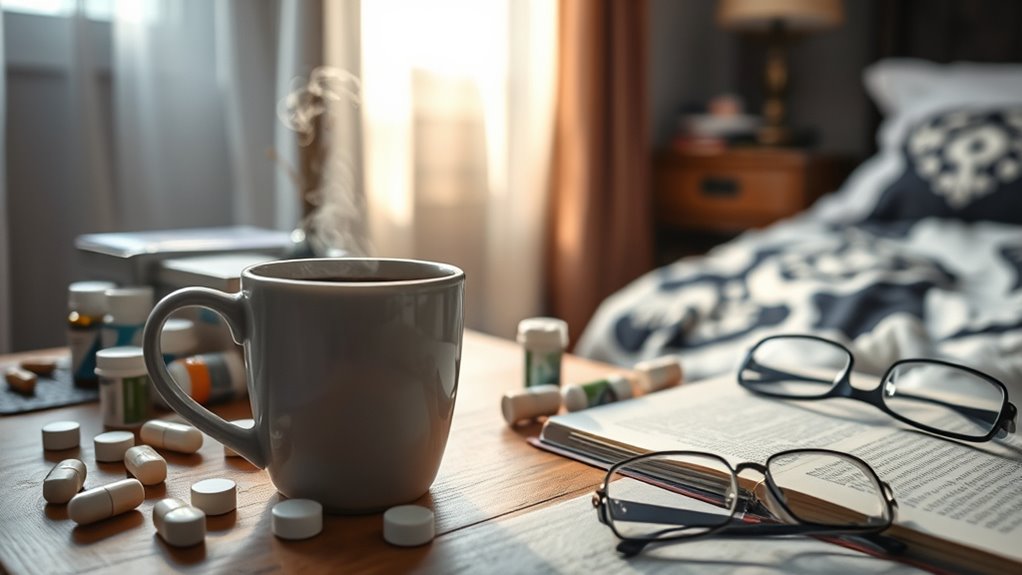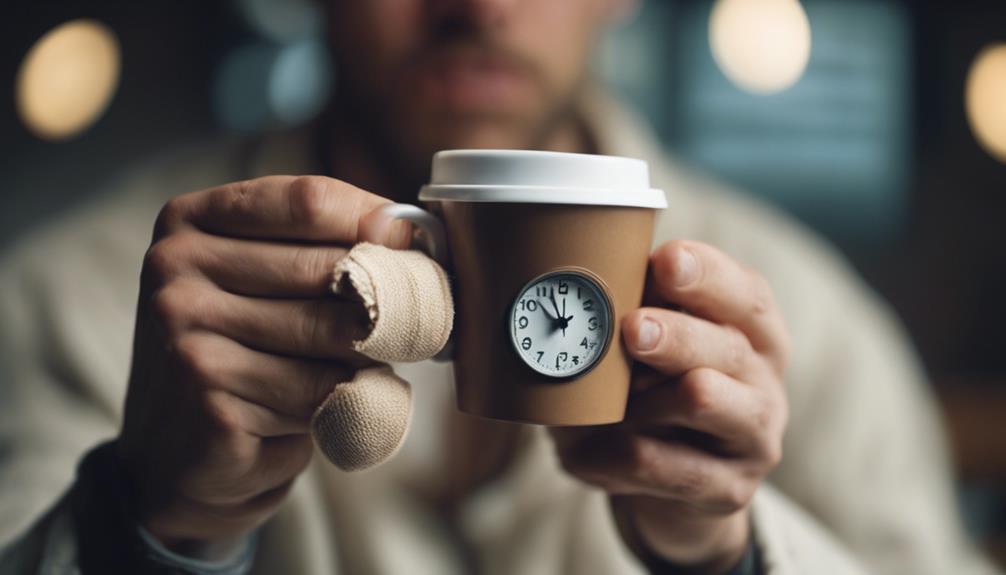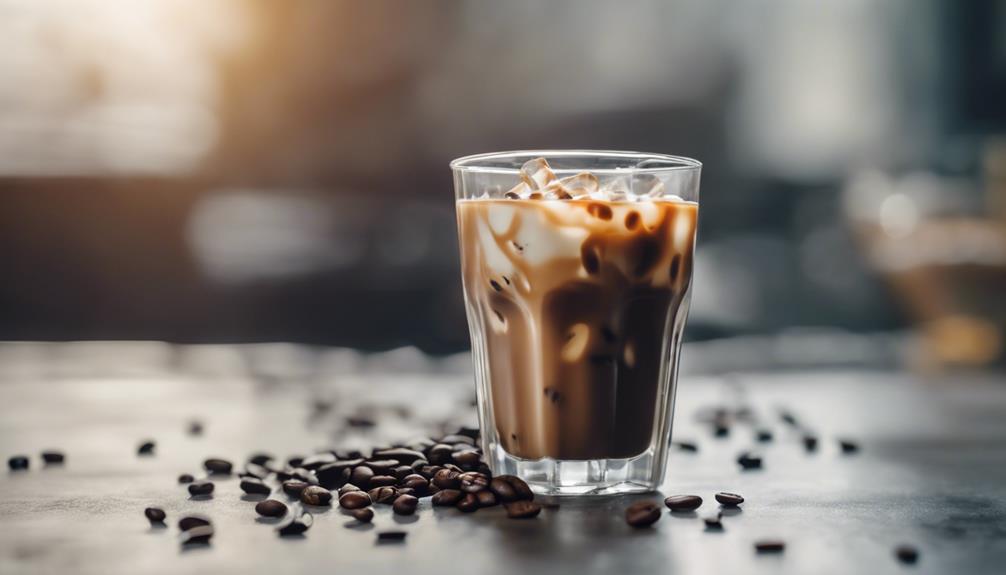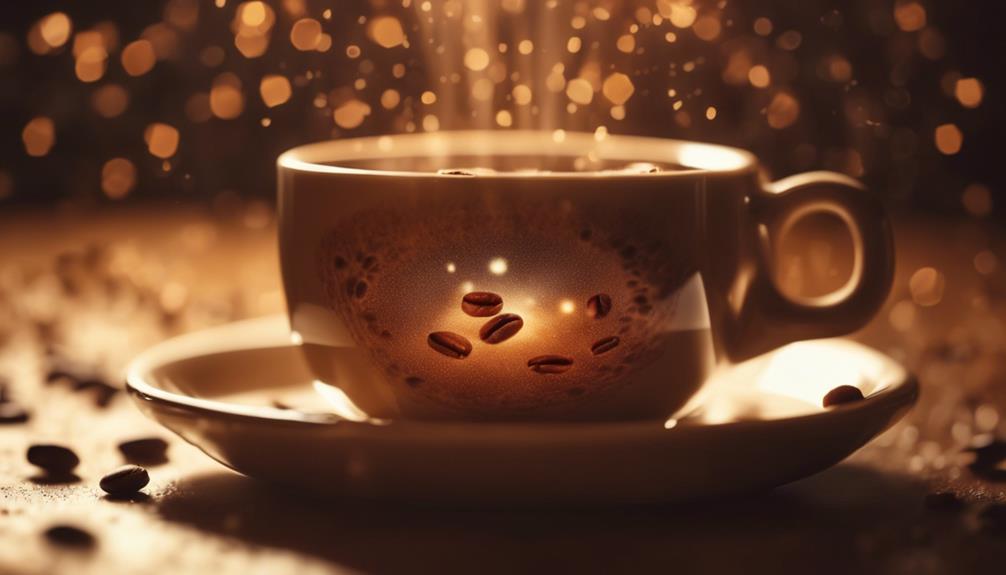Drinking coffee impacts your sleep because caffeine blocks adenosine receptors in your brain, which normally promote sleepiness. This interference makes it harder for you to fall asleep and can lead to lighter, fragmented sleep. Because caffeine’s half-life ranges from 3 to 5 hours, drinking late in the day means active caffeine stays in your system longer, reducing your sleep quality. Keep going to discover simple strategies to enjoy coffee without sacrificing restful nights.
Key Takeaways
- Coffee contains caffeine that blocks sleep-promoting adenosine receptors, making it harder to fall asleep.
- Consuming coffee late in the day prolongs sleep latency due to residual caffeine in the system.
- Caffeine’s half-life (3-5 hours) means it can linger, disrupting sleep quality and reducing total sleep duration.
- Drinking coffee in the afternoon or evening can cause fragmented, lighter sleep with more awakenings.
- To improve sleep, limit coffee intake after mid-afternoon and maintain consistent sleep routines.
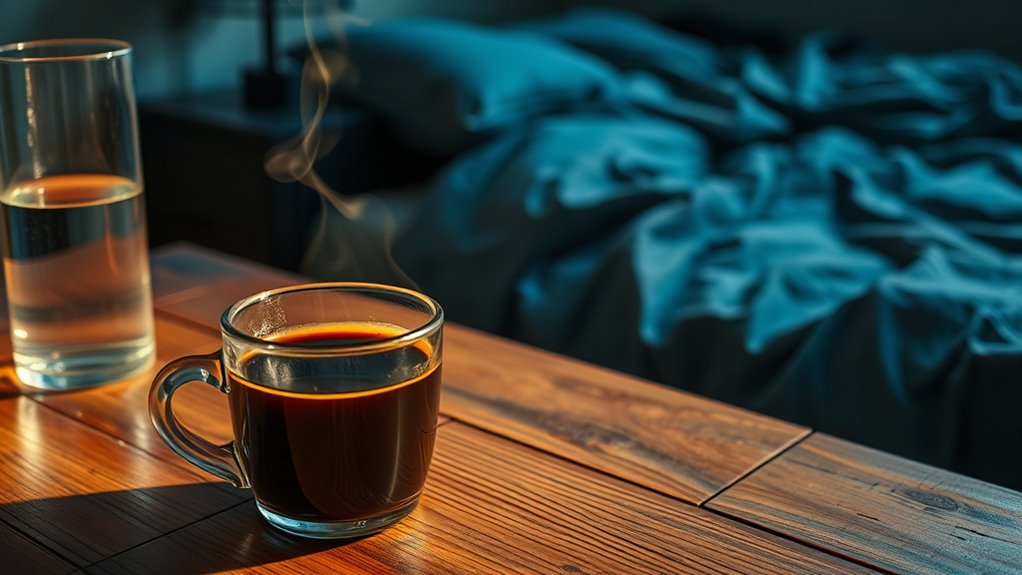
Coffee contains caffeine, a stimulant that blocks adenosine receptors in your brain, making it harder to fall asleep and reducing sleep quality. When you drink coffee, caffeine binds to these receptors, preventing adenosine from inducing sleepiness. This interference leads to increased sleep latency, meaning it takes longer for you to drift into sleep once you’re in bed. Even small amounts of caffeine consumed hours before bedtime can negatively impact your sleep hygiene, making restful sleep harder to achieve.
Caffeine blocks sleep-inducing adenosine, increasing sleep latency and harming overall sleep quality.
The half-life of caffeine, which ranges from 3 to 5 hours, plays a notable role in how caffeine affects your sleep. If you have caffeine in your system six hours before bed, a substantial amount may still be active when you lie down, prolonging your sleep latency and decreasing your overall sleep duration. This lingering caffeine can cause fragmented sleep, reducing the time you spend in deep sleep stages that are essential for physical and mental restoration. Understanding caffeine’s half-life can help you time your intake more effectively.
Consuming caffeine later in the day doesn’t just delay your ability to fall asleep; it also diminishes sleep quality by disrupting your sleep cycle. You may find yourself waking up multiple times during the night or experiencing lighter, less restorative sleep. Over time, these interruptions lead to decreased sleep efficiency, meaning you spend less time in quality sleep and more time awake or in lighter sleep stages.
This pattern can leave you feeling less refreshed and more fatigued during the day, even if you don’t notice the disturbances consciously. If you’re mindful about caffeine consumption, especially closer to your usual bedtime, you can help preserve your sleep duration and quality. Reducing or avoiding caffeine intake in the late afternoon or evening supports better sleep hygiene.
Establishing a consistent sleep routine and limiting caffeine after a certain hour can considerably decrease sleep disruption caused by caffeine’s effect on adenosine receptors. Recognizing how caffeine’s half-life influences your sleep can help you plan your caffeine intake wisely, ensuring it doesn’t interfere with your ability to fall asleep promptly and enjoy undisturbed, restorative sleep throughout the night.
Frequently Asked Questions
Does Coffee Really Affect Sleep?
You might wonder if coffee truly impacts your sleep. The answer is yes. Caffeine, the main stimulant in coffee, blocks sleep-promoting chemicals in your brain, making it harder to fall asleep and reducing sleep quality.
Even if you drink coffee hours before bed, it can still interfere with your sleep cycle, causing lighter, fragmented sleep and leaving you tired. To improve rest, consider limiting caffeine intake later in the day.
Will I Sleep Better if I Stop Drinking Coffee?
Yes, you’ll sleep better if you stop drinking coffee. When you cut back, your body can reduce caffeine’s blocking of adenosine receptors, which helps you fall asleep faster and stay asleep longer.
Within a few days, you’ll notice less night waking and more deep and REM sleep, leading to more restful nights. Over time, your natural sleep cycle stabilizes, improving your overall sleep quality.
What Is the 90 Minute Coffee Rule?
The 90 Minute Coffee Rule means you should stop drinking coffee at least 90 minutes before bed. This window allows caffeine levels in your bloodstream to drop considerably, reducing its stimulating effects.
Since caffeine peaks within 30 to 60 minutes and has a half-life of 4 to 6 hours, waiting this period helps you fall asleep faster and enjoy better sleep quality by minimizing caffeine’s impact on your rest.
How Do I Know if Caffeine Is Affecting My Sleep?
You might notice difficulty falling asleep, waking up often, or feeling unrested, but caffeine could be the culprit even if you don’t realize it. Pay attention to longer sleep times to fall asleep and frequent awakenings during the night.
If you consume caffeine within six hours of bedtime, it’s likely disrupting your sleep. Objective measurements or noticing more wakefulness can reveal caffeine’s hidden impact on your sleep quality.
Conclusion
So, if you want better sleep, it’s best to limit your coffee intake, especially in the afternoon and evening. Caffeine stays in your system for hours, making it harder to fall asleep and reducing sleep quality. Pay attention to how your body reacts and try to cut back if you notice trouble sleeping. Small changes can make a big difference in ensuring you wake up refreshed and ready for the day.
